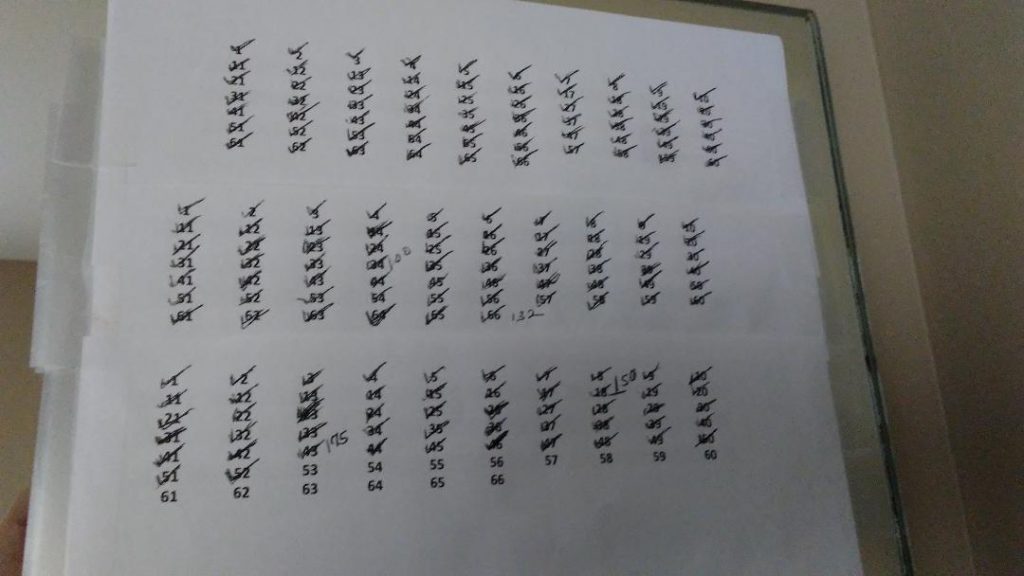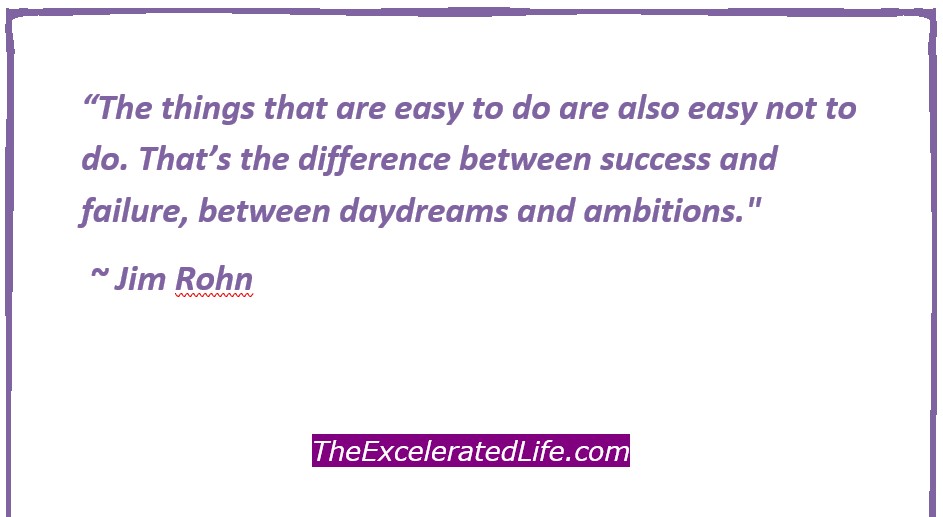Success comes from doing a few simple things, every day, over time. And failure comes from not doing those simple things, every day, over time. Consistency is key.
“Nothing in the world can take the place of Persistence. Talent will not; nothing is more common than unsuccessful men with talent. Genius will not; unrewarded genius is almost a proverb. Education will not; the world is full of educated derelicts. Persistence and determination alone are omnipotent. The slogan ‘Press On’ has solved and always will solve the problems of the human race.” ~ Calvin Coolidge
The Stone Cutter
Imagine you come upon a stone cutter standing before a huge rock. As you watch, he strikes the stone with his hammer. Nothing happens. He strikes again. Nothing. He continues hitting the stone and you begin to count the number of times: 3, 4, 5, 6 . . . 48, 49, 50 . . . 95, 96, 97, 98, 99 . . . Nothing. You can barely see that he has hit the stone at all.
But on the 100th blow, the stone breaks in two. “Wow,” you might think. “That 100th blow must have been tremendous!” But you’d be wrong.
Consistency Is Key
Anagarika Shri Munindra was a Buddhist monk from India who helped introduce insight meditation to the western world. [Glick] Munindra gave us the analogy of the stone cutter: “If the rock-breaker strikes the stone ninety-nine times and it doesn’t break, yet it breaks on the hundredth strike, were the first ninety-nine wasted? Perhaps all ninety nine strikes were needed before the stone would break.” [Glick]
It looks to an outsider as if the stone was broken by a major blow on the 100th strike but, in fact, it required the consistency of all 99 strikes leading up to the final blow to break the rock. Consistency is key.
The “Plateau Of Latent Potential”
Paper burns at 451° F. If you heat paper up to 400° F, nothing happens. Heat it to 425° and nothing happens. Even at 450° – nothing. But when you heat it that one extra degree, to 451° F, the paper bursts into flame.
Water boils at 212° F. Heat it to 200°, nothing. 210°, nothing. 211°, nothing. But when you heat it that one extra degree, to 212° F, water boils and turns to steam.
Ice melts at 33° F. If you heat an ice cube to 25°, 30°, or 32°, nothing noticeable happens. But when it hits 33°, you start to see drops of water coming from the ice.
Now, is all that effort wasted to heat the paper up to 450°? Of course not. Or to heat the water to 211° or the ice cube to 32°? Of course not. That consistency of effort is key to achieving the final result.
James Clear calls this the “Plateau of Latent Potential”. [Clear] The stone cutter had to hit the stone 100 times before it broke. For 99 strikes, it appears that nothing is happening. Then, on the 100th strike, the rock breaks. But the result depends just as much on the 99 hits as it does on the hundredth.
“Change can take years,” says Clear, “before it happens all at once.” It is important to continue taking your tiny steps, day after day, even though you won’t see much improvement, perhaps for a long, long time. But you are building up latent potential. Then one day, the rock breaks, the paper ignites, the water boils, the ice cube begins to melt, and you suddenly become aware of how much you have changed.
Motivation And Ability
“Persistence is the ability to maintain action regardless of your feelings. You press on even when you feel like quitting.” [Pavlina]
For years, I have struggled to build a habit of flossing every night. I had periodontal disease as a younger man and it is important that I maintain good dental health.
But my flossing has always been hit or miss. That is, until Saturday, October 26, 2019. How can I be so precise? Well, it’s because of something I read.
In The One Thing, Gary Keller reports that research from University College in London determined that it takes on average 66 days to acquire a habit. Some don’t take as long. Some habits take much longer. But on average, it requires 66 days. So I printed up a form that lists the numbers from 1 to 66.
In order to help build the flossing habit, I taped one of my forms to my bathroom mirror. Then I created a ritual to begin flossing my teeth. To get a check mark, I only required myself to complete the ritual, not necessarily to complete the flossing. I made one tiny step.
On Saturday, October 26, 2019, I completed my flossing ritual and checked off number 1 on the form. Incidentally, I did all the flossing as well. On Sunday, I did the same thing. And on Monday, Tuesday, Wednesday, Thursday, and Friday. Each time I completed my “flossing ritual”, I gave myself a check. And I found that, once I did the ritual, I completed the flossing too.
Soon, I had two week’s worth of check marks, then a month. When I completed all 66 days, I taped up another form. By then, I was highly motivated to floss because I didn’t want to miss a check and break my streak.
Last night, as I write this, I made my 178th check. I’m about to fill my third form. Flossing is now part of my nightly routine.
Persistence builds motivation. Plus, an action repeated becomes easier. [Fogg]

Doing Reps
“Progressive training means that once you succeed, you increase the challenge.” [Pavlina]
You don’t go to the gym to lift Styrofoam weights. On the other hand, you wouldn’t start by trying to lift 300 pounds. Progressive training looks like this: Start where you are. Make a small improvement. Do it. Do it again. And again. After a week, add a little more. Repeat the process.
Continue till you reach your goal.
When To Give Up
Do you remember the company called Traf-O-Data? No? That’s not surprising since it failed. But it was the first company started by two friends, Paul Allen and Bill Gates, who went on to found Microsoft. [Mejia]
Traf-O-Data had limited success, but eventually failed. What if Gates and Allen had put all their efforts into making a go of this tiny company with a limited scope (it read and reported on traffic flow data). We might never have had the company called Microsoft and all of our lives would have been very different.
So if things aren’t going as planned, consider this:
Do you need to update your plan? Jeff Olson reminds us in The Slight Edge that “the plan you start with will not be the plan that gets you there.” [Olson] If you feel stuck, consider if a change in your plan is required.
Is your goal still correct? If you are working your plan but you still feel stuck, maybe your goal isn’t your goal. Maybe it’s time to move on to one that is more meaningful to you.
While consistency is key, “foolish consistency,” as Emerson reminds us, “is the hobgoblin of little minds.” It does no good to strike a rock 100 times if it isn’t the rock you wanted to break.
Taking Action
Here is a plan for taking your small steps every day. “Remember, it’s easy to do the little things, every day. It’s also easy not to do them.” [Rohn] Choose the “easy” that will take you to your desired destination – failure or success.
- Select an area to focus on: your goal, the fundamentals (eat move sleep), or some other improvement.
- Devise a small step for a small improvement in your area of focus.
- Take the step.
- Do it every day – don’t skip a day.
- If you skip a day, be sure you do it the next day. NEVER skip 2 days. If you miss a day, make doing your step the #1 priority for the next day.
IfWhen you fail / miss the mark / don’t do what you said you’d do:
a) Don’t beat yourself up .
b) See it as an experiment — analyze what went wrong.
What were you thinking?
What can you do next time?
Are there safeguards you could put in place to prevent this in the future? (e.g., change environment, make the step smaller, others?)
c) Have a plan to address the issue. Use If . . . then implementation intentions.
Chiseling Your Character
“Personal success is built on the foundation of character, and character is the result of hundreds and hundreds of choices you make that gradually turn who you are at any given moment into who you want to be.”
“Character comes from a Greek word meaning ‘chisel,’ or ‘the mark left by a chisel.’ Of course, a chisel is a sharp steel tool used for making a sculpture out of a hard or difficult material, like granite or marble.” [Rohn]
Remember the stone cutter. She may strike the rock 100 times before it breaks — but all 100 taps are necessary. You are the stone cutter of your life, chipping away to reveal your character.
Consistency is key. Don’t give up because you don’t see any progress. You are building potential. One day, after many small steps, you’ll become an “overnight success”. Continue to take your small steps . . . that is embracing the Excelerated Life™!
Excelerated Self-discipline™ — doing what you say you will do — is one step in creating your Excelerated Life™, a life of flourishing and well-being and a life of meaning, purpose and service.
Read more about the Excelerated Life™.
Resources:
Clear, James. Atomic Habits: Tiny Changes, Remarkable Results. New York: Avert, an imprint of Penguin Random House LLC, 2018
Glick, Rabbi Yoel. Living The Life Of Jewish Meditation. Woodstock, VT: Jewish Lights Publishing, a Division of Simon & Schuster, 2014.
Mejia, Zameena. “Microsoft exists because Paul Allen and Bill Gates launched this high school business first.” CNBC Make It. CNBC LLC., 16 October 2018. Web. 23 April 2020.
https://www.cnbc.com/2018/10/16/microsoft-exists-because-paul-allen-and-bill-gates-launched-this-high-school-business.html
Pavlina, Steve. “Self-Discipline: Persistence.” Steve Pavlina. Website Steve Pavlina, 10 June 2005. Web. 30 March 2020.
https://www.stevepavlina.com/blog/2005/06/self-discipline-persistence/
Rohn, Jim. Leading an Inspired Life. Lake Dallas, TX: Success Books, 1997.



One Reply to “Consistency Is Key”